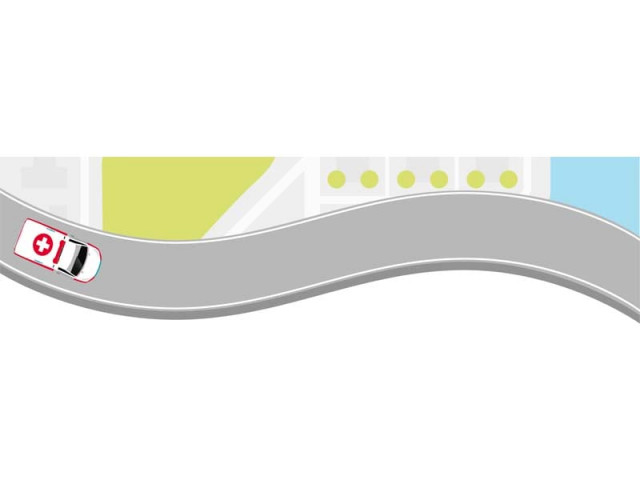Real-life heroes: How to save a person’s life – give way
#RastaDein campaign highlights the plight of ambulance drivers in the country

DESIGN BY SOBIA KHAN & HIRA FAREED
I had picked up a gunshot victim from Korangi and was near the Qayyumabad Chowrangi when my way was blocked by a Prado land cruiser. I had the siren on and asked them to move to the side as I had a patient in my vehicle but they didn’t. The driver parked his land cruiser in front of my ambulance and two of them got out. They began to beat me — slapping and punching me for asking them to move. They only let me go once they saw I really had a patient in my ambulance.
China donates 80 ambulances to Pakistan
This is just a single incident of violence experienced by Asghar, an ambulance driver who has worked for the Edhi Foundation for 12 years. For him, this is an ordinary day on the job.
Seventy-five per cent of ambulance workers in Karachi have experienced violence, physical or emotional torture, while on the job. Sixty per cent of this ill treatment is at the hands of attendants and family members of patients. One of the reasons for this is that drivers often refuse to give way to ambulances.
“A car blocking an ambulance’s way or a nurse being slapped in the face might seem a lot less dramatic and intense than a bomb blast or assassination of a polio vaccinator but the fact that these events happen all the time at virtually all healthcare institutions means that they have an enormous effect on the functioning of healthcare services,” explained Maciek Polkowski, head of the International Committee of the Red Cross’s (ICRC) Health Care in Danger project.
“In emergency care, the moments following the accident are the most crucial for the survivability of the patient,” said Dr Seemin Jamali, head of emergency at Jinnah Postgraduate Medical Centre (JPMC). “The first hour after the accident is known as the golden hour, no time should be lost in getting the injured into the hospital,” she explained.
NSF seeks to empower women via ‘Draw for Feminism’ campaign
This is where the #RastaDein campaign comes in. Director Hamza Bangash of CityLights Productions was commissioned to create a series of Public Service Announcements (PSAs) on the topic of violence towards ambulance drivers. His team has created three television advertisements, three radio advertisements and a series of billboards to go with the campaign. “We wanted to do justice to their stories,” he said, adding that most of the stories he had heard were “disturbing”. “No one should have to go through [this abuse] if they’re just doing their job,” he exclaimed.
It took four months for Bangash’s team to create the PSAs, which were aired on 15 TV channels from March 11 to March 16. According to Polkowski, the PSAs are being broadcasted on radio stations till April 11 and billboards will be up across the city for a month.
“Thanks to our research, we have uncovered an entire area of every-day, low-level violence against healthcare workers that is normally not the focus of the media and public discourse,” explained Polkowski, referring to a study conducted by APPNA Institute of Public Health, in collaboration with JPMC, on violence against healthcare workers in Karachi. He explained that medical researchers and doctors involved in the project had a vested interest in it, as many have lost colleagues or have been threatened themselves.
“So far we have carried out a major public health study on the dynamics of violence against healthcare [workers], an in-depth analysis of the legal framework for their protection and an observational study on obstruction of ambulance services in traffic,” he said. Simplistic reactions — such as giving doctors weapons to defend themselves — can often do more harm than good, according to Polkowski.
The campaign aims to develop training on de-escalating inter-personal violence and promote legal changes to protect healthcare workers. “We believe the campaign can go a long way in making the public aware of the issue and helping change people’s attitudes,” he said, adding that they also want to work on the legal aspect of the issue to create a system allowing drivers to make space for ambulances.
Woman delivers baby girl in ambulance stuck in traffic
So far, according to Polkowski, the project has received extremely strong support from the Karachi commissioner, provincial health minister and traffic DIG Dr Amir Shaikh but they still have a long way to go. “We don’t want temporary, stop-gap solutions, we want something proper, permanent and with the agreement of all those concerned. And this will unfortunately take time,” he explained.
Published in The Express Tribune, March 20th, 2016.



















COMMENTS
Comments are moderated and generally will be posted if they are on-topic and not abusive.
For more information, please see our Comments FAQ